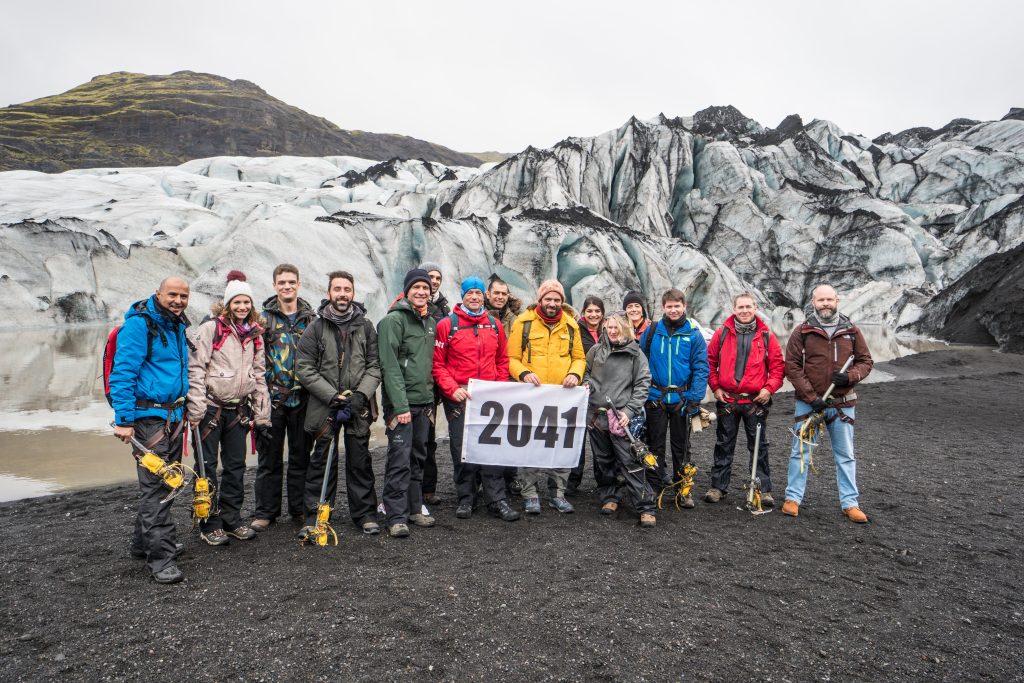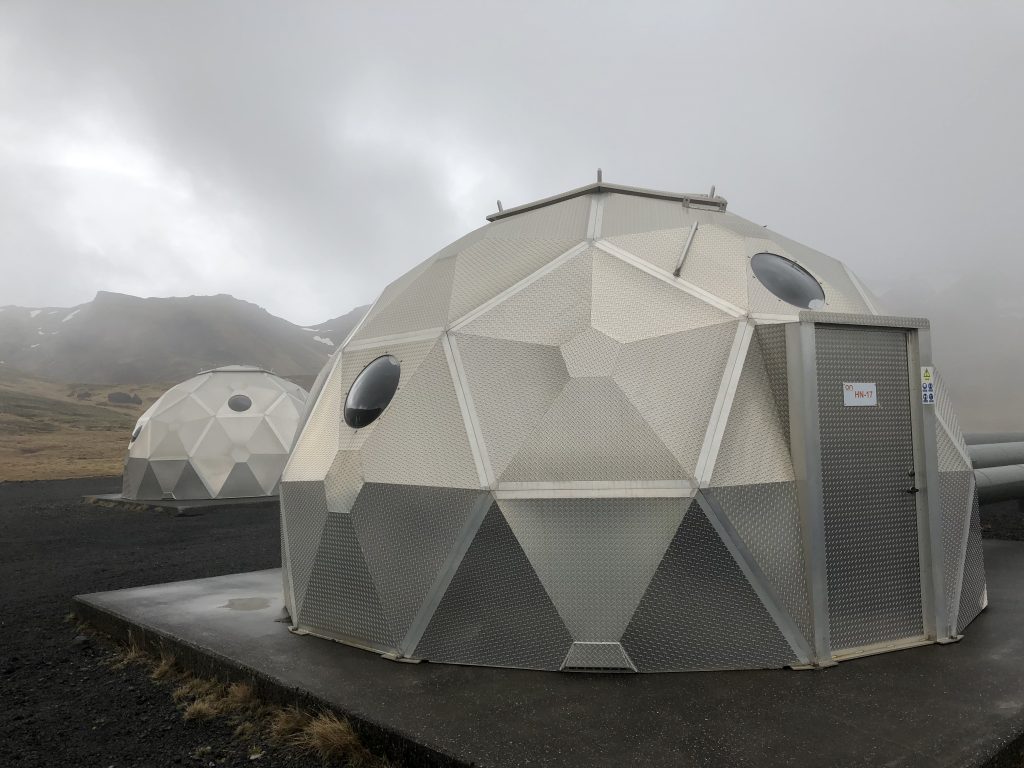Sulfur scents dominate the air in parts of Iceland. If you could bottle it, it would be a distinct yet important element of what makes Iceland, Iceland. As part of a climate leadership group, I visited the country in June to learn more about its leadership in climate change commitments.
With participants from Shell (an oil company), BNP Paribas (a retail banking company), CommVault (a data management company), and the Adventure Travel Trade Association (ATTA), this eclectic group of business leaders was brought together by Jeff Bonaldi of Explorer’s Passage and Robert Swan of ClimateForce. The BNP Paribas participants were awarded the opportunity to attend via an application process for climate-related business ideas. The other participants, as well as myself, were there to learn and also share our perspectives on climate from our industries.

Climate strikes throughout the world and natural disasters and changing weather patterns are hard to ignore. From Costa Rica to Sweden, countries around the globe found hope in the Paris climate agreement, heeded the sense of urgency unearthed with the IPCC special report, and made commitments to do their part in the face of climate change. As I learned during this leadership in climate change gathering, Iceland is among those that has taken a proactive approach to addressing this universal issue.
To set the stage, Guðmundur Ingi Guðbrandsson, Iceland’s minister of environment and natural resources, met with the group. We participated in a discussion and were able to ask him questions about Iceland’s commitment to climate. As a hired member of public office and with previous non-governmental organization experience, it was clear his commitment to a long sustainable plan for Iceland was authentic and important. The country has been put in the spotlight for its overtourism issues, and I was interested to learn how it planned to address some of its unique challenges, especially because it is an island nation.
Among its commitments is a “third revolution in transportation.” Because of Iceland’s ability to focus on geo and hydrothermal electricity, it plans to transform its transportation dependence from fossil fuel-run planes, ships, and cars to electric, biofuel, hydrogen, methane, or other means. Iceland’s goal is to reduce its carbon footprint by 2030 to meet the goals outlined in the Paris agreement and be carbon neutral by 2040. To do this, all companies in Iceland need to become carbon neutral. One way they plan to achieve this is through a cooperative that includes diverse industries such as agriculture, fisheries, hard metals, and airlines. Together, they will be expected to work with the state to tell a positive story of change to consumers and commit to the climate goals.
“People want to do it but don’t know how,” Guðbrandsson said. “The government body of Iceland will be carbon neutral by 2019. We believe this will be a powerful message to others. Going forward, every big project that the Iceland government does, they will factor in the climate change implications.”
During the climate leadership expedition, our group learned about several businesses based in Iceland working directly with climate issues. At ON Power Station, we saw how geothermal energy works but also how Climeworks, a company capturing carbon dioxide from the atmosphere and then injecting it back into the earth, utilizes a geothermal plant’s infrastructure. We saw the injection process as well as the mineralized crystals that form from this carbon dioxide just two years later. Iceland can play an important part in removing carbon already existing in the atmosphere; it supports an important need for our planet since carbon reduction strategies on their own cannot meet the need for decreasing carbon to sustainable and healthy levels.
Spending time with Icelandic Mountain Guides (IMG), we discussed and experienced climate action against a different backdrop. A long-time ATTA member and sponsor of the Climate Action Leadership Studio, the organization led a trek to Sólheimajökull Glacier with a knowledgeable IMG guide who filled us in on the changing landscape of Iceland due to climate change. Each year the glacier we trekked recedes 65 meters; in a few hundred years, scientists predict Iceland’s glaciers could be gone.
As a country with vast open natural spaces, renewable energy, an eager population, and opportunities for tourism across the country, it is critical that Iceland becomes a leader in sustainability. Iceland’s tourism increased 20% to 40% a year from 2013 to 2017, and now it is slowing and leveling off. This is an opportunity to review the country’s needs, convene as a community, and ensure travelers have high-quality, sustainable experiences. A small number of destinations are travel hotspots, such as Seljalandsfoss waterfall and the Blue Lagoon, but the countless mountains and volcanoes, quaint seaside villages, and steep majestic fjords are ready for exploration. With climate change commitments in mind, community stakeholders aligned, and business leaders ready to innovate, Iceland’s tourism businesses could lead the way in climate commitments.
Tourism is an important business and one that Iceland would like to keep healthy and sustainable. A conversation with Arnar Már Ólafsson of IMG revealed the company is working on a new project in a popular adventure destination in the south of Iceland. IMG’s plans include building a sustainable and climate-friendly operation that manages visitor flows and addresses accessibility needs, produces its own energy and food, and considers sustainable transportation. IMG also recently released a film, Meltdown, on climate change and its effects on Iceland’s glaciers. The film supports the company’s goal to provide education and environmental advocacy to reduce climate’s impact. IMG’s work is an example of the storytelling and commitments the government needs businesses to take to move its commitments forward.

Tax incentives, VAT breaks, pushing companies to innovate instead of waiting to meet regulations: These are the strategies Iceland will deploy to meet its goals. Another company located in Iceland due to the advantages the country offers is a data center called Verne Global. Data storage is responsible for 8% of carbon emissions — the same amount of emissions as the travel industry. All the photos, emails, texts, files, and videos around the world take an enormous amount of energy to store. The phone in your hand is not as climate-friendly as you may think.
Verne Global chose Iceland because 90% of the country’s power is not used, there was an existing power grid for aluminum smelters, and it was extremely scalable. Now the data center is one of the most sustainable data centers in the world because it is 100% run off of renewable geothermal, hydrothermal, and wind power energy.
As Swan remarked at the beginning of our expedition, “What is the key to any successful plan? Commitment.” This is what I saw with the business people in Iceland and why I believe Guðbrandsson has little to worry about when he said, “It is really a challenge to keep up with the pace of demand of climate action change. But it also is the most important task, and Iceland’s plan is to work fast so people don’t lose hope.”
Register today to reserve your spot at the Climate Action Leadership Studio 20 September 2019.
This article is part of an Adventure Travel Trade Association (ATTA) initiative addressing important topics identified as critical to the protection and continued advancement of the adventure travel industry. Each initiative — eliminating plastics, women in leadership, climate action, and young leaders — has a dedicated team focused on building awareness of, advancing educational opportunities in, and creating a lasting impact on each of these areas within the adventure travel industry. We invite you to visit the ATTA’s initiatives page where you can access reports, read the latest news, participate in active projects, and join conversations within the membership community.
